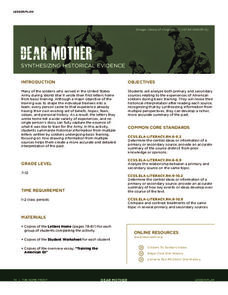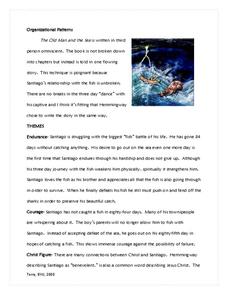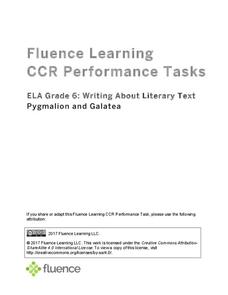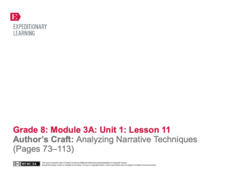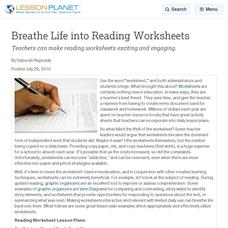All for KIDZ
The Orphan of Ellis Island
Everyone comes from somewhere. An interdisciplinary lesson on Elvira Woodruff's The Orphan of Ellis Island includes discussion starter and writing prompts for the novel, as well as a graphic organizer to help learners begin their own...
National WWII Museum
Dear Mother: Synthesizing Historical Evidence
It's one thing to read history, it's another to live it. Pupils examine secondary and primary sources that detail the training of soldiers before deployment. Then, they consider the impact of primary sources on how they understand the...
EngageNY
Bringing Douglass’s Words to Life: The Fight with Covey
Readers have the opportunity to bring the words from an excerpt of Narrative of the Life of Frederick
Douglass to life. They use strategies from the Storyteller’s
Toolbox anchor chart as a guide and then work in pairs to prepare their...
DocsTeach
Analyzing a Petition about Slavery
Practice analyzing primary sources in a thought-provoking lesson on the impact of slavery. Young historians read a petition regarding the Fugitive Slave Law and answer a series of questions to understand the importance of the document....
Smithsonian Institution
Borders within the United States: Indian Boarding Schools and Assimilation
Native American Nations ... sovereign entities or removable tribes? A thought-provoking lesson explores the relationship between Native American tribes and the United States, including forced assimilation and removal from their ancestral...
Smithsonian Institution
Re-Segregation of American Schools: Re-Segregation
Examine the re-segregation of public schools in a thought-provoking resource. Young scholars read articles and primary sources, complete worksheets, and watch a video to explore the idea that desegregation made schools more segregated....
Center for History Education
A Presidential Decision - The Bay of Pigs
The lesson examines President Kennedy's response to the Bay of Pigs Crisis and Cold War tensions. Academics learn how the information President Kennedy had affected his response to the question of whether to invade Cuba. Scholars read...
Media Smarts
Kellogg Special K Ads
Foster class discussion about body image with the resources and questions provided here. Focus on Special K's "look good on your own terms" ad campaign. Learners start by reading about this campaign and analyze a series of print ads,...
Curated OER
House and Holmes: A Guide to Deductive and Inductive Reasoning
Test your pupils' reasoning skills with several activities and a quick mystery to solve. Learners watch and analyze a few video clips that demonstrate reasoning in action, practice deduction with an interactive and collaborative...
Curated OER
The Old Man and the Sea: Concept Analysis
Use a helpful concept analysis guide when planning your unit on Ernest Hemingway's The Old Man and the Sea. The resource covers plot elements, literary themes, and possible issues to address in order to make the work accessible to all of...
Fluence Learning
Writing About Literary Text: Pygmalion and Galatea
Is it crazy to fall in love with your own work, or is that the purest love of all? Compare two renditions of the classic Greek myth Pygmalion and Galatea with a literary analysis exercise. After students compare the similarities and...
Fluence Learning
Writing an Argument: Persuasive Speeches to Students
Powerful orators make their messages compelling with a combination of factors. Learn how to be an inspirational speaker with a reading assessment activity that presents a list of persuasive speaking techniques, as well as two speeches...
Judicial Learning Center
Article III and the Courts
What's the best way to make sense of the Constitution? A helpful lesson contains both the text of Article III and annotation of each of its sections, breaking it down into easy-to-understand parts. It also includes links to a glossary...
EngageNY
Author’s Craft: Analyzing Narrative Techniques (Pages 73–113)
Scholars discuss a reading selection in Unbroken by writing to a partner about text selection. After completing the writing, learners revisit the use of active and passive sentences by reviewing a second Active and Passive Sentences...
EngageNY
Mid-Unit Assessment: Justification for Character and Scene Selection
When it comes to love and midsummer nights, confessions are tricky. Learners place themselves in the shoes of a character from William Shakespeare's A Midsummer Night's Dream and explain how a character manipulated another character in...
EngageNY
Studying Conflicting Interpretations: Perspectives on Plessy v. Ferguson: Part 3
Scholars closely read Justice John Marshall Harlan's dissenting opinion in the Plessy v. Ferguson case, seeking to understand why he disagreed with the court's decision that racial segregation laws for public spaces were constitutional....
EngageNY
Speech Structure: Unions as Agents of Change— Part 2
Scholars continue reading César Chávez's 1984 speech, "Address to the Commonwealth Club of California." Working with partners, they complete graphic organizers to determine a claim that Chávez makes about the UFW.
Constitutional Rights Foundation
Elections, Money, and the First Amendment
Those who spend the most, win. Academics read informational text, participate in group discussion, and defend campaign reforms to understand the correlation between money, the First Amendment, and election results. The resource explains...
DocsTeach
Apollo-Soyuz: Space Age Detente
The Space Race saw the Soviet Union and the US go from competitors to partners. Scholars read a letter regarding the first docking of the US and Soviet space craft. Young historians also complete a written assignment and participate in...
DocsTeach
Baseball: A Morale Booster During Wartime?
How did baseball become America's national pastime? A sports-minded activity explores the importance government placed on baseball to boost morale during both world wars. Academics read letters to understand the importance of baseball...
Anti-Defamation League
Representing the People: Diversity and Elections
After studying statistics and reading articles about diversity in the 2018 through 2020 U.S. elections, young social scientists discuss what they believe is the impact of having more diverse elected officials. Individuals then select one...
Curated OER
Teaching Strategies For Main Idea Lessons
Main Idea Lesson Plans can help teachers make identifying the main idea of a passage a breeze.
Curated OER
Verdi
Third graders explore language arts by answering study questions about a book they read. In this reading summary instructional activity, 3rd graders read the book Verdi by Janell Cannon and identify the plot, characters and sequence of...
Curated OER
Breathe Life into Reading Worksheets
Teachers can make reading worksheets exciting and engaging.
Other popular searches
- Guided Reading Lessons Plans
- Guided Reading Lessons 4 6
- Guided Reading Lessons K 2
- Free Guided Reading Lessons
- Guided Reading Lessons Frogs
- Guided Reading Lessons 3 6
- Ell Guided Reading Lessons



